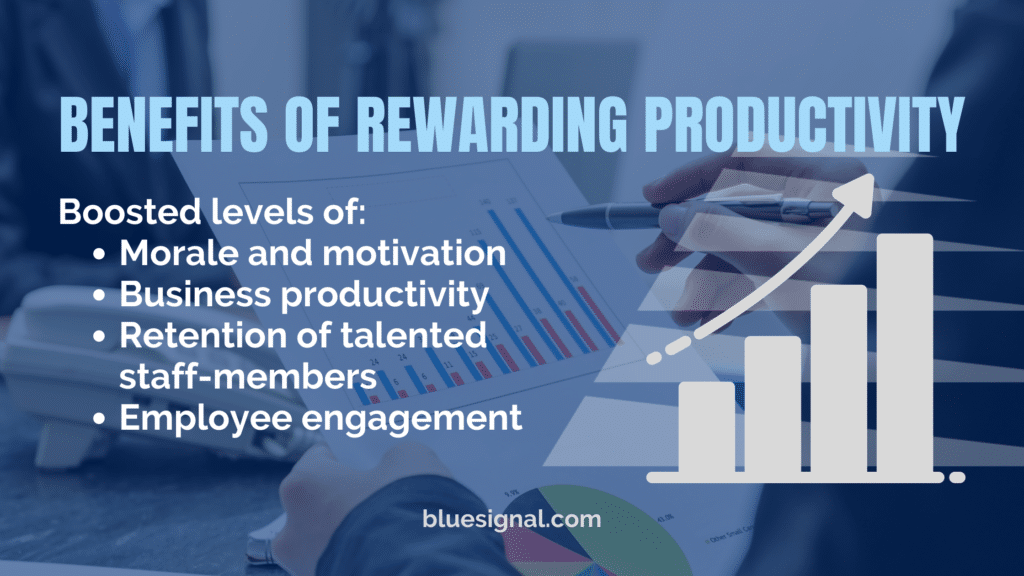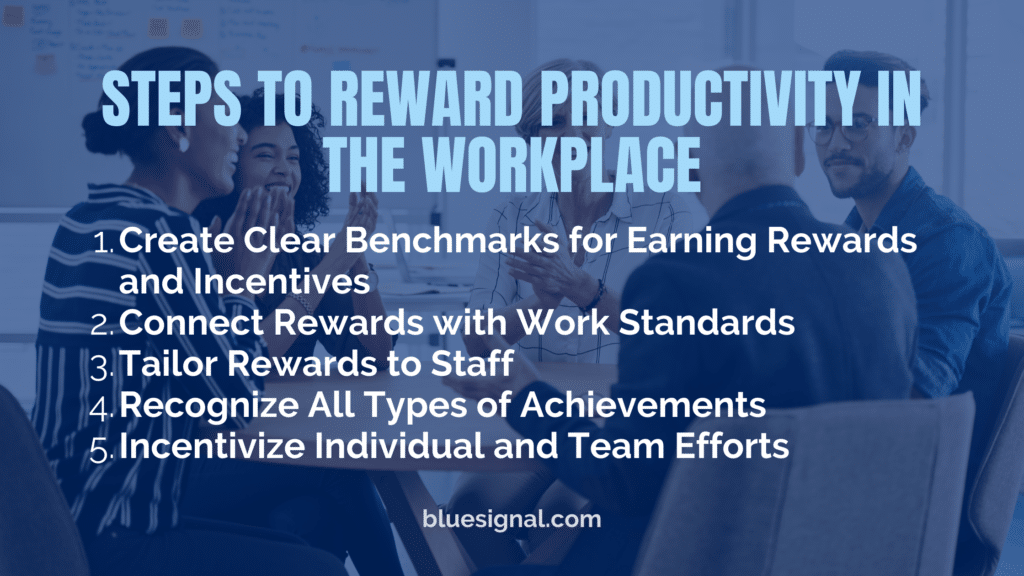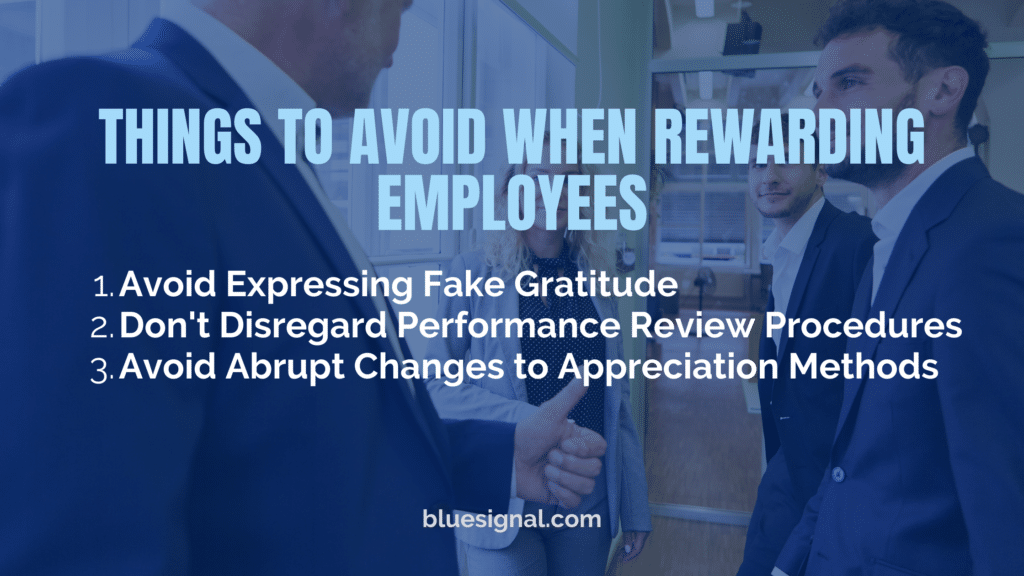In today’s candidate-driven landscape, retention and employee satisfaction directly impact company results. Employers who actively recognize diligent workers can set themselves apart, and benefit from substantial levels of business success. Encouraging performance, progression, and productivity are regular working practices that will help companies win the war for talent.
It’s evidential the more you praise good work, the more likely it is to continue and compound results. But then we face the questions, “How do you reward employees without alienating the rest of your workforce?” and “How do you provide incentives without ruining workplace morale for those who don’t hit the mark?” Here are some tactics for rewarding productivity without alienating and overlooking the rest of your employees.
What Does ‘Rewarding Productivity’ Mean?
Rewarding productivity or performance is recognizing an employee for exceptional work achievements. That’s saying, “These standout players are going beyond the norm.” Examples of typical workplace achievements which may be rewarded or recognized include:
- Boosting sales targets
- Increasing output or clientele
- Enhancing quality of production
- Offering above and beyond service
- Delivering process improvement ideas
- Reducing faults and weak points
- Complying with workplace protocols
Employers use performance appraisals and systems to award over-achievers. By bringing attention to the actions that support the trajectory of the company, it inadvertently pinpoints opportunities for improvement. While the main aim of the system is to encourage employees to aspire high and wide, it has many unforeseen byproducts.
What are the Benefits of Rewarding Productivity?
The correlation between motivation, productivity, and rewards is slowly changing. At one point, people were solely motivated through promotional opportunities and financial rewards. Today, people’s motivators are evolving. Combining material with psychological incentives can result in achieving employee and business goals collectively. Some of the biggest benefits for rewarding productivity can lead to an increase in:
- Morale and motivation
- Business productivity
- Retention of talented staff-members
- Employee engagement

For top performers, rewards are a surefire way to boost job satisfaction. However, for those who are not able to achieve those same results, it can begin to alienate some employees despite your best intentions.
How Rewarding Productivity Can Cause Alienation in the Workplace
Not all professionals are made the same. Similarly, not all professionals can deliver the same results. If they did, there wouldn’t be such thing as a “top performer”! By doing the job well, good professionals can still only hit their goal – and not exceed it. For those that are able to meet their goal, it can be demotivating to see recognition come only to those who’ve exceeded them. Alienation sets in when this perfectly average employee feels undervalued in their role, despite doing what they were hired to do.
If employees feel undervalued, they could decide to seek employment elsewhere. Harvard Business Review produced a report in 2016 stating that recognizing employees is the simplest way to improve morale. Researchers found that 82% of American employees felt they don’t receive enough praise at work. 40% from the same pool stated they would actively work harder if supervisors recognized their efforts.
So What’s the Best Way to Reward Productivity in the Workplace?
Rewarding staff is so much more than handing out vouchers or a paid day-off. The main goal should be to boost morale and increase motivation overall – not create a hierarchy of achievers vs. the rest. Here are some best practices for rewarding productivity that can help you avoid alienating other workers:

1. Create Clear Benchmarks for Earning Rewards and Incentives
Employers should outline rewards and incentives through programs, systems, and procedures. The best reward programs are simple. Employees should know exactly what they’re aiming for – whether that’s a sales metric or delivery of certain projects. When setting these benchmarks, employers must give clear instruction on how to effectively meet those goals and provide tools to boost performance and progression on that path. If employees are unaware of how to win awards or the guidelines are unclear, it can lead to frustration and discouragement.
2. Connect Rewards with Work Standards
Consider connecting rewards with workplace standards. If employees understand the correlation between good work and rewards, they’re more likely to focus on reaching those requirements. An easy route is to provide different levels of achievement along the way. The more an employee sells, for example, the more recognition they gain. Recognize them for keeping pace with company standards. It’s more encouraging when levelling up is an achievable next step. Celebrate the merit-worthy, smaller wins along the way. The more rewards they reach, the more likely they are to be motivated to reach for that next level of achievement.
3. Tailor Rewards to the Staff
If the rewards have no bearing with the staff’s wants and needs, they probably won’t strive for them. Every business has its own workplace culture; so, copying traditional reward systems isn’t always the wisest decision. By tailoring rewards to suit your workforce, personnel are bound to be more incentivized through their interests. If your team members have expressed an interest in staycations, social events, or even an upgrade in tech – meet them where they’re at. Personalize rewards to demonstrate a proactive investment in employees’ preferences. This will no doubt lead to an increase in business loyalty and aspiration to outperform. Furthermore, it helps assure them that their voices have been heard.
4. Recognize All Types of Achievements
It’s too common of an occurrence for employers to get fixated on hitting big targets. Huge business achievements should be celebrated – like closing a deal with a multi-corporate business or signing a high-flying socialite to advertise a product. However, this can create favor to certain departments by dismissing those that aren’t revenue producing. It’s just as significant to recognize all levels of business achievements. Ideally, this system should practice recognizing achievements in everyday operations. Create merits not solely about reaching the big numbers – celebrate career progression and a job well done.
5. Incentivize Individual and Team Efforts
Results can be the end-product of an individual’s hard work. But more often than not, success comes from a team effort. Take a bespoke approach for incentives and reward systems on a team-to-team basis. Provide teambuilding events, sponsored happy hours, or team-wide bonuses as a reward. Teamwork can strengthen productivity, engagement, and overall business relations. Strong collaboration and communication can prove to be solid byproducts for business success – so reward it sufficiently.
Things to Avoid When Rewarding Employees
Fairness should be foremost when giving recognition. Still, it’s impossible to keep everyone satisfied. Employees should feel empowered to bring up concerns of unfavorable or discriminatory treatment to you directly, so that you can address concerns as they come up – but that won’t always be the case. For the best shot at success, here are steps to avoid alienating staff while rewarding productivity:

1. Avoid Expressing Fake Gratitude
Empty appreciation can sometimes be worse than no thanks at all. When praising an employee or showing appreciation to a team, it must come from a genuine place. Instead of a half-empty or generic thank-you, provide gratitude where it’s deserved.
2. Don’t Disregard Performance Review Procedures
From annual reviews to weekly check-ins, it pays to utilize performance reviews and acknowledge progress. It helps keep employees on track to achieving their goals, and it gives employers an opportunity to address areas for improvement head on.
3. Avoid Abrupt Changes to Appreciation Methods
Present the idea of introducing new reward practices before launching a full-scale overhaul. Have conversations with department leaders and supervisors with their ears to the ground to ensure a strong understanding of what employees would want to see. Leverage tools and services like reward consultancy companies, which can help introduce productive appraisal services. These reward company’s appraisal systems can help to encourage employee engagement. Not to mention, bringing in professional support can help avoid feelings of favoritism or bias.
The End Results for Rewarding Productivity
Through an active effort in valuing hard work – not just the highest achievements – employees will feel inspired to succeed. An increase in business production, loyalty, and retention are significant end-products that will make it well-worth your effort. Learn as you go and take the time to monitor any changes you make to reward processes. Adapt as the business evolves, and you’ll be sure to beat out the competition by retaining employees that are motivated and engaged. By practicing genuine care for your staff’s welfare, you’ll soon see that your business will be rewarded through loyalty, excellence, and success.
As your partner in the process, Blue Signal strives to help your company reach its fullest potential with all employees – not just the ones you hire from us! If you want to learn more about the best ways to help unite your team by rewarding productivity, give us a call.
